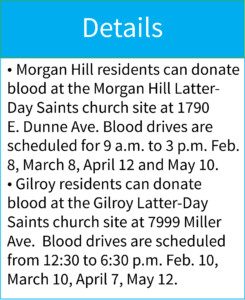Editorial: Red Cross needs blood as nation faces a supply crisis
Red Cross blood drives and donation centers follow the highest standards of safety and infection control
![]()

Editorial is the opinion of Gilroy Life
Blood is life, the saying goes. The fluid that flows in our veins and arteries is a necessity to keep our bodies functioning. Unfortunately, the U.S. stock of blood is dangerously low. The American Red Cross said the nation now faces a crisis with the worst blood shortage in more than a decade.
 We have less than one day’s supply of blood on hand as a nation. That means in theory that if people stopped giving blood, in less than 24 hours hospitals across the country would have none to give to patients. In recent weeks, the Red Cross has had to limit critical blood product distributions of plasma and platelets to hospitals. As much as one-quarter of hospital blood needs are not being met.
We have less than one day’s supply of blood on hand as a nation. That means in theory that if people stopped giving blood, in less than 24 hours hospitals across the country would have none to give to patients. In recent weeks, the Red Cross has had to limit critical blood product distributions of plasma and platelets to hospitals. As much as one-quarter of hospital blood needs are not being met.
Several major factors have contributed to this public health crisis. Among them are the COVID-19 challenges, including a 10 percent overall decline in the number of people donating blood as well as ongoing blood drive cancellations and staffing limitations. The pandemic has contributed to a 62 percent drop in blood drives at schools and colleges. Besides the surge of COVID-19 cases with the vast spreading Omicron variant, winter blizzards and heavy storms are compounding the already-dire situation facing the blood supply.
The Red Cross also is seeking the help of volunteers to support critical blood collections across the country. Blood drive volunteers play an important role by greeting, registering, answering questions and providing information to blood donors throughout the donation process. Blood transportation specialists — another volunteer opportunity — provide a critical link between blood donors and blood recipients by delivering blood to hospitals in communities across the country.
 If you’re nervous about giving blood, remember that Red Cross blood drives and donation centers follow the highest standards of safety and infection control, and additional precautions. These include face masks for donors and staff, regardless of vaccination status. These have been implemented to help protect the health of all those in attendance. Donors are asked to schedule an appointment prior to arriving at the drive.
If you’re nervous about giving blood, remember that Red Cross blood drives and donation centers follow the highest standards of safety and infection control, and additional precautions. These include face masks for donors and staff, regardless of vaccination status. These have been implemented to help protect the health of all those in attendance. Donors are asked to schedule an appointment prior to arriving at the drive.
To donate blood, individuals need to present a blood donor card or driver’s license or two other forms of identification that are required at check-in. Individuals who are 17 years of age or older, weigh at least 110 pounds and are in generally good health may be eligible to donate blood. High school students and other donors age 18 and younger also must meet certain height and weight requirements.
 The Red Cross supplies 40 percent of the nation’s blood supply. Blood cannot be manufactured or stockpiled and can only be made available through the kindness of volunteer donors. Please consider booking additional appointments further out due to the fact that while availability of drives may be impacted, the need for blood remains constant.
The Red Cross supplies 40 percent of the nation’s blood supply. Blood cannot be manufactured or stockpiled and can only be made available through the kindness of volunteer donors. Please consider booking additional appointments further out due to the fact that while availability of drives may be impacted, the need for blood remains constant.
America’s low blood supply levels are posing a risk to patient care. It’s forcing doctors to make difficult decisions about who receives blood transfusions immediately and who will need to wait.
If you are eligible, make an appointment to give blood or platelets in the days ahead to ensure no patient is forced to wait for critical care. Who knows? The blood you give might save the life of a stranger — or a friend or family members.
